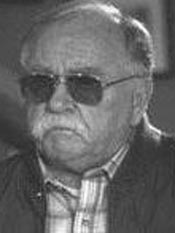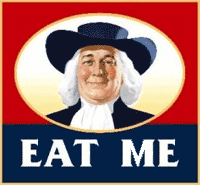The Quaker Oats guy
“That Quaker Oats guy makes some good motherfuckin' oatmeal”
The Quaker Oats guy (1644-1718) was the colloquial name of William Penn,[1] an acquisitive leader of colonial America who subsisted solely on instant oatmeal and grew to unprecedented proportions.
Childhood[edit]
William Penn was born in colonial America and was christened into Quakerism, a colonial religion that celebrated the sacrament of overeating and used to listen to the rumbling (or "quaking") of their stomachs for "messages" from the Almighty.[2] Penn's special love of breakfast oatmeal (which the colonials used to flavor with acorns and lichen), his dominant size, and his religious appeal, made him an obvious pitchman for the Quaker Oats Company.
Exodus to America[edit]
The Quakers had been persecuted in Ireland and sought to emigrate en masse to America. There was the nagging problem that the Americans in New England were persecuting them too. Penn had already begun showing his two dominant traits, buying stuff and eating stuff, and solved the problem by buying Western New Jersey (though he refrained from eating it). The Quakers could all move there and live, though they would have to learn to cope without winters lasting seven months.
Penn's acquisitive tendencies were not sated, however, and in short order he also bought:
- The other half of New Jersey (yes, every single exit)
- A light bulb plant (the notorious Pennsylvania, which was so gigantic that it was ultimately admitted to the Union)
- A cereal company, envisaging getting his breakfasts at a discount.
This final acquisition was brilliant in retrospect, as the new nation was showing tendencies for the gluttony for which it would later become known.
Marketing knock-offs[edit]
The cereal company took Penn's likeness and used his face on the packages. The name of Quaker Oats was a boardroom compromise, after Fatso Oats didn't do well in focus-group polling.
Penn's status as the namesake of breakfast cereal survived frequent accusations of pedophilia. He was often said to troll schoolyards, befriend young girls, and lure them to his coach with a trademark come-on line, "Nothing is better for Thee...than me!" The cereal company test-marketed, but withdrew, a product called Pedomeal. A contemporaneous invention, the pedometer, was brought to market but then sold to a company outside the packaged-food industry.

Demise, curse, and resurrection[edit]
Penn died serenely in Philadelphia, surrounded by his family and friends. His stature in the casket was so immense and other-worldly that city fathers agreed that no building should thereafter be built in Philadelphia taller than the height of Penn's oatmeal gut. This agreement persevered, and Philadelphia developed as a city of shacks and single-story homes,[3] until the building of One Liberty Place in the 1980s. Owing to what is now known as "the Curse of Billy Penn," the Phillies have sucked ever since. However, the "City of Brotherly Love" has had urban peace despite the Curse, requiring only an infrequent police firebombing to preserve civil order.
Resurrected in 1963 in a very bad mood, Penn was the first actor cast in the role of The Doctor on Doctor Who. Unfortunately, old habits resurfaced soon after the corpse did, and the reincarnated Penn was fired after he tried to play The Doctor with a child actress doing a cameo appearance. Penn's name is usually omitted in lists of the many dissimilar men who played the role.
References[edit]
- ↑ The Wikipedia article calls this "a common misconception." We call it "a great theme for an article."
- ↑ This was undoubtably a precursor to sects that God inspires to "speak in tongues."
- ↑ A triumph of city planning that simplified the landing approach to the airport in the area's principal city, Camden, New Jersey.
See also[edit]
| |||||||||||||||||||||


